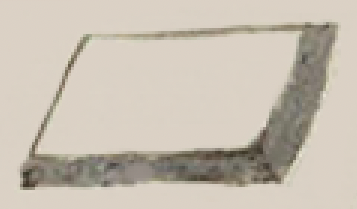amatl (CST24)
This painting of the simplex glyph for the term amatl (paper) shows a stack of white paper at an angle and showing perspective. These pages of paper are blank. Nothing is said about the purpose of the paper. It may have been for the local notary, or perhaps for the church assistant called a fiscal.
Stephanie Wood
Glyphs of paper can show it rolled up and tied, or it can come in pages, such as this. Sometimes it appears to have writing on it, but usually paper with writing, typically with an alphabetic look and sometimes held up by a pole, is glossed as amatlacuilolli. One amatl glyph seems to show a large piece of paper folded over a wooden bar, perhaps so it could dry, which may reveal some clues about its production.
Stephanie Wood
amatl
Stephanie Wood
1550–1564
Jeff Haskett-Wood
hojas de papel, resmas de papel en blanco

ama(tl), paper, https://nahuatl.wired-humanities.org/content/amatl
papel
Stephanie Wood
Códice Sierra-Texupan, plate 24, page dated 1559. Origin: Santa Catalina Texupan, Mixteca Alta, State of Oaxaca. Kevin Terraciano has published an outstanding study of this manuscript (Codex Sierra, 2021), and in his book he refers to alphabetic and “pictorial” writing, not hieroglyphic writing. We are still counting some of the imagery from this source as hieroglyphic writing, but we are also including examples of “iconography” where the images verge on European style illustrations or scenes showing activities. We have this iconography category so that such images can be fruitfully compared with hieroglyphs. Hieroglyphic writing was evolving as a result of the influence of European illustrations, and even alphabetic writing impacted it.
https://bidilaf.buap.mx/objeto.xql?id=48281&busqueda=Texupan&action=search
The Biblioteca Digital Lafragua of the Biblioteca Histórica José María Lafragua in Puebla, Mexico, publishes this Códice Sierra-Texupan, 1550–1564 (62pp., 30.7 x 21.8 cm.), referring to it as being in the “Public Domain.” This image is published here under a Creative Commons license, asking that you cite the Biblioteca Digital Lafragua and this Visual Lexicon of Aztec Hieroglyphs.








